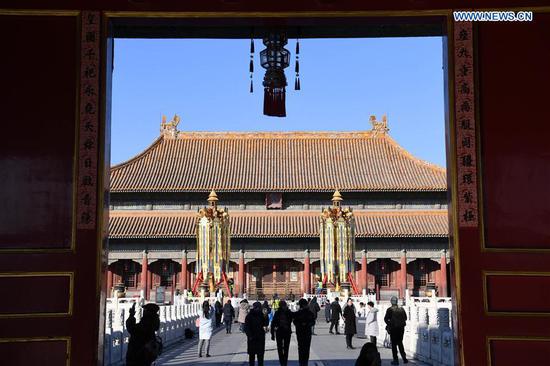As the partial U.S. government shutdown enters its 33rd day on Wednesday, Native American tribes say they are feeling the impact as critical funds are cut, straining their resources for health care and food.
Meanwhile, Republican and Democratic Senate leaders agreed on Tuesday to vote on dueling proposals to reopen the government, the first sign of progress to end a stalemate that has left as many as 800,000 government workers without pay. Both proposals are expected to fail because either would need 60 votes to advance.
Senate Majority Leader Mitch McConnell set up two votes for Thursday. The first vote will be on President Donald Trump’s proposal to reopen the government, provide $5.7 billion in funding for a wall on the border with Mexico and extend legal protections to some immigrants for three years.
If it fails, the Senate would then vote on House-passed legislation backed by Democrats for a continuing resolution to fund the government through Feb 8 without providing new funding for the wall.
As for Native Americans, police officers on the Boise Forte Indian Reservation — a two-hour drive from the city of Duluth in northeast Minnesota — are being required to work without pay, Cathy Chavers, the chairwoman of the reservation, told China Daily.
In California, the shutdown is affecting a network of 10 Indian health centers across the state that provide health care for three-quarters of a million Native Americans, according to media reports.
The Pawnee Nation tribe in Oklahoma launched a GoFundMe campaign to buy groceries for families of federal workers affected by the government shutdown. Many employees are still working, according to the tribe, but without pay.
In Michigan, a Chippewa tribe already has been forced to use its own funds to pay some $100,000 to keep clinics and food pantries open, according to The New York Times.
There are 573 federally recognized tribes in the U.S.. Under treaties dating back before the founding of the country, the U.S. government is required to guarantee funds for services, including health care, education, and infrastructure, in exchange for getting huge swaths of territory.
“America’s longstanding, legally mandated obligations to tribal nations should be honored no matter the political quarrels of the moment,” read a letter signed last week by top officials with the National Congress of American Indians, the National American Indian Housing Association, the National Indian Health Board and other groups.
Federal funds come through the Bureau of Indian Affairs (BIA), which now is operating only with essential employees during the shutdown.
According to the Health and Human Services Department’s shutdown plan, about 9,000 Indian Health Service employees, or 60 percent, are working without pay, and 35 percent are working with funding streams not affected by the shutdown.
That includes staff providing direct care to patients. The agency delivers health care to about 2.2 million Native Americans and Alaska Natives across the country.
“The federal government shutdown is impacting all areas of Indian country,” said Kerry Hawk Lessard, executive director of Native American Lifelines, which provides services to indigenous Americans from Baltimore to Boston.
Hawk Lessard said the organization closed the medical and behavioral health clinic for Native Americans in Baltimore and Boston last Saturday as the funding ran out.
The agency provides services including dental care, disease prevention, and health counseling.
“The money to operate our facility has effectively stopped coming in, but the patients have not stopped needing health care,” Hawk Lessard said to local online publication Navajo-Hopi Observer. “We thus far have had to deny purchase of care requests that are critical to chronic care management including insulin, blood pressure medication, and antibiotics.”
According to the Navajo Division of Transportation, about 8,000 miles of roads hit by snow in New Mexico, Arizona, and Utah and managed by the Bureau of Indian Affairs remain mostly unplowed since the beginning of the shutdown. The BIA is part of the Interior Department, which has furloughed thousands of its workers.
Bald Eagle said that although the food stamps were issued this month and would be in effect through February, the real problem for them is that they are in a remote area, and the government has to deliver the food to them from the distribution centers.
“We’re being told that if the federal shutdown continues, they will not be able to get that food to the reservation because their transportation workers are third-party contractors,” Remi Bald Eagle said. “They’re not sure if they can pay them or not.”
Some tribes now are making plans for how much longer they can operate, while not knowing whether they will be reimbursed for shutdown-related expenses.
“We started on Jan 3 having meetings, and we’re looking at phases to incorporate a plan for how we can manage as far as we can to shut down,” Chavers said.


















































